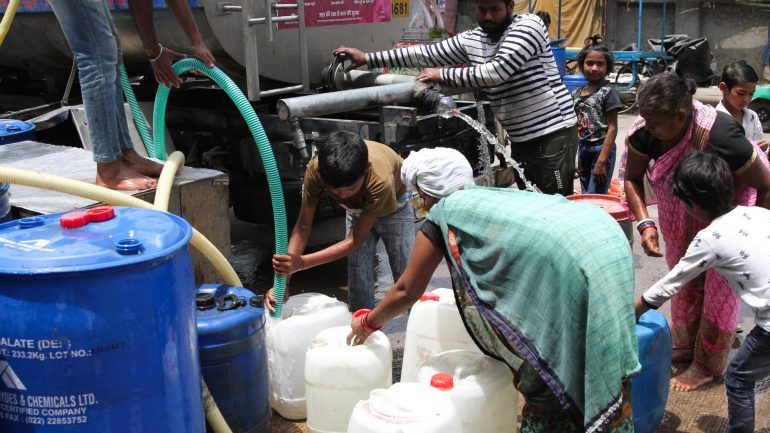Status: 05/03/2022 3:31 PM
India is grappling with the scorching heat in which at least 25 people have lost their lives. There is a danger of floods in the neighboring country of Pakistan due to heavy snowfall. There is no sign of easing in any country.
In India, the scorching heat has killed more than two dozen people in the state of Maharashtra alone including the capital Mumbai. A state spokesman said 25 people had died of heat stroke since the end of March. There have not been deaths from such heat for more than five years.
Most of the victims are in rural areas. It is believed that there may be other victims of heatstroke in other parts of the country. Recently, temperatures in excess of 40 degrees Celsius have been measured in many areas. In Subarnapur in Odisha state, the thermometer soared to 43.2 degrees Celsius.
Fires broke out in some landfills across the country – due to a build-up of heat and gases, the fire department said. In the capital New Delhi, the Bhalswa landfill continued to burn for days, causing a plume of toxic fumes to engulf the area. Some schools in the area had to be closed. TV station “India Today” reported that the gases cause breathing problems especially to children and the elderly.
Firefighters survey the fire at the Bhalswa landfill site in New Delhi. The landfill, which covers an area of more than 50 football pitches and is taller than a 17-story building, caught fire from extreme heat.
Image: DPA
Expert: Extreme weather becoming more common
The World Meteorological Organization recently warned that severe heatwaves are affecting millions of people these days in densely populated countries like India and Pakistan. Temperatures around 45 degrees are not uncommon in this area. But it is usually not as hot as late April or early May.
This is also corroborated by the analysis of Mary Zacharias and Friedrich Otto of Imperial College, London. “Before the rise in global temperatures, we would have experienced the heat that India would have experienced this month almost once in 50 years,” Zakaria explained. Now such an event happens almost every four years. Unless greenhouse gas emissions stop, this will happen even more frequently.
power and crop failure
Electricity consumption is skyrocketing due to summer. The coal reserves on which India is heavily dependent are not full. This has led to recent prolonged power outages, so that even wealthy households who can afford air conditioning can’t always expect cooling.
Large wheat growers are also at risk of crop failure in view of the heat. In the Indian states of Punjab, Haryana and Uttar Pradesh, wheat yields declined by 10 to 35 per cent due to the initial heat wave, The Economic Times newspaper reported.
Pakistan gave flood warning
In India’s neighboring country of Pakistan, officials have warned of floods due to rapidly melting snow on the Hindu Kush mountains.
The provincial government has put the Civil Defense Authority on alert. According to Pakistan’s climate change minister Sherry Rehman, the amount of rain this year was more than half what it was in previous years.
Eventually, the weather services of both countries declared a certain coolness in many areas and light rain at the beginning of the week. However, according to the weather services of both the countries, soon above normal temperatures are expected in various areas.

Introvert. Proud beer specialist. Coffee geek. Typical thinker. Pop culture trailblazer. Music practitioner. Explorer.





